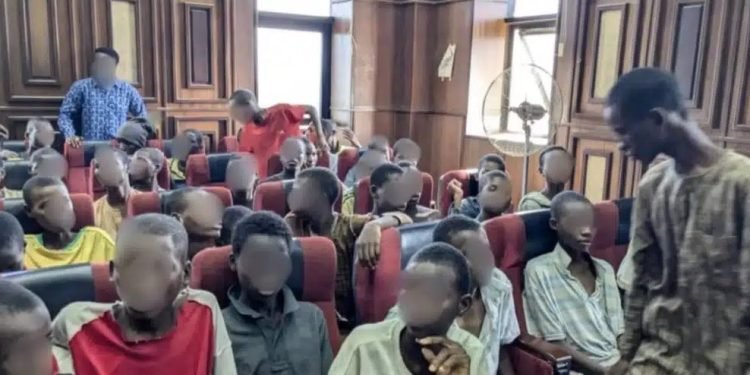The Attorney-General of the Federation and Minister of Justice, Lateef Fagbemi (SAN), has stated that arraigning and trying minors who have committed crimes is not unconstitutional, as some have claimed.
The AGF added that, according to the Nigerian Constitution, trying to detain #EndBadGovernance protesters (minors) in a Federal High Court is not inappropriate, given the crimes with which they are charged.
Fagbemi made this statement late Thursday night in Abuja, at the commissioning of Law Corridor’s new office complex and the presentation of a book on the modern Nigerian legal system.
Recall that following the nationwide protest tagged #EndBadGovernance, which took place between August 1 and 10, security agencies arrested several protesters.
Following the arrests, the Inspector-General of Police, Olukayode Egbetokun, was scheduled to arraign 119 protesters in two batches before Justice Obiora Egwuatu of the Federal High Court in Abuja on Friday, 1 November.
The first batch consisted of 76 protesters, while the second included 43. During the arraignment of the first batch, four defendants collapsed.
This sparked public outrage, largely because minors were among the defendants, and they appeared malnourished.
Addressing the criticism that followed their arraignment, the AGF said, “Let me seize this opportunity to clarify something.
There is a misconception that, because these are children and minors (the arraigned #EndBadGovernance protesters), various theories have surfaced. No law in this country says a minor cannot be tried, and I have also heard suggestions that they should go to a family court.
The study of the law and the Constitution leaves you no other conclusion than that the Federal High Court has jurisdiction in matters bordering on treason and related issues, so whatever the situation, the President has closed the chapter by his decision to have these young men released.”
The AGF also noted that considering the facts of the case, the offences were serious. Nonetheless, President Bola Tinubu, as a father and grandfather, chose to pardon them and drop the charges.
“The President was very compassionate; he is a father and a grandfather. If you look at the facts in the possession of the security agency, you would marvel, but the President said, despite all this, ‘I have children, grandchildren,’ and that motivated his passion to release them and also enable them in some ways. So, the credit goes to him for showing compassionate consideration in releasing the young chaps.”
Speaking on the Supreme Court’s judgment on local government financial autonomy, the AGF noted that implementation would be a gradual process, as he would not initiate a project he couldn’t complete.
“It takes time to achieve full implementation, but it will be done. By the time we achieve this, everyone will be satisfied. I will not start a project I cannot finish. The President is happy with it, everyone is pleased, and the public’s response to the Supreme Court’s decision suggests that the President couldn’t have done better.”
The AGF also advised legal practitioners to embrace partnerships in the profession, adding that partnerships enhance expertise, increase capacity, improve risk management, and provide more benefits.











